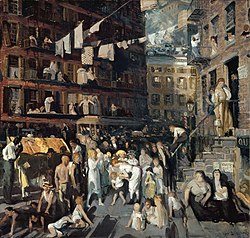Top Qs
Timeline
Chat
Perspective
Urban realism
Cultural movement active from the 1880s to the 1930s From Wikipedia, the free encyclopedia
Remove ads
Urban Realism is a cultural and artistic movement that developed in the late 19th and early 20th centuries as a reaction to the rapid urbanization and industrialization of cities, particularly in Europe and the United States. The movement is characterized by its focus on the everyday realities of urban life, often highlighting the struggles of the working class and marginalized communities. Urban Realism sought to present an unvarnished, sometimes gritty portrayal of city life, contrasting with the more idealized representations of the time. Artists associated with this movement, such as those in the Ashcan School, used a dark and muted color palette to emphasize the mood and atmosphere of the urban environment, reflecting the social, economic, and political challenges of modern city living.[1]
Remove ads
Characteristics
Urban Realism is characterized by its focus on the gritty, often harsh realities of city life. Artists and writers associated with the movement frequently employed a dark and muted color palette, using these tones to emphasize the somber and sometimes bleak atmosphere of urban environments. The movement often highlighted issues such as poverty, labor exploitation, and the struggles of immigrants, using these themes not only to depict reality but also to critique the social conditions of the time.[2]
Remove ads
Influence and legacy
The Ashcan School, with artists such as Robert Henri, George Bellows, John Sloan, and Everett Shinn played a significant role in the development of American art, particularly within the Urban Realism movement. These artists shifted the focus of their works from the previously idealized urban scenes to the more direct and honest realities of urban life, particularly in New York City and Paris, emphasizing the daily lives of the working class and immigrant communities. Their realistic portrayals provided a fresh perspective on urban life and influenced both public perception and the artistic narrative, contributing to a lasting impact on American art and society.[3][4]
Remove ads
References
Wikiwand - on
Seamless Wikipedia browsing. On steroids.
Remove ads

